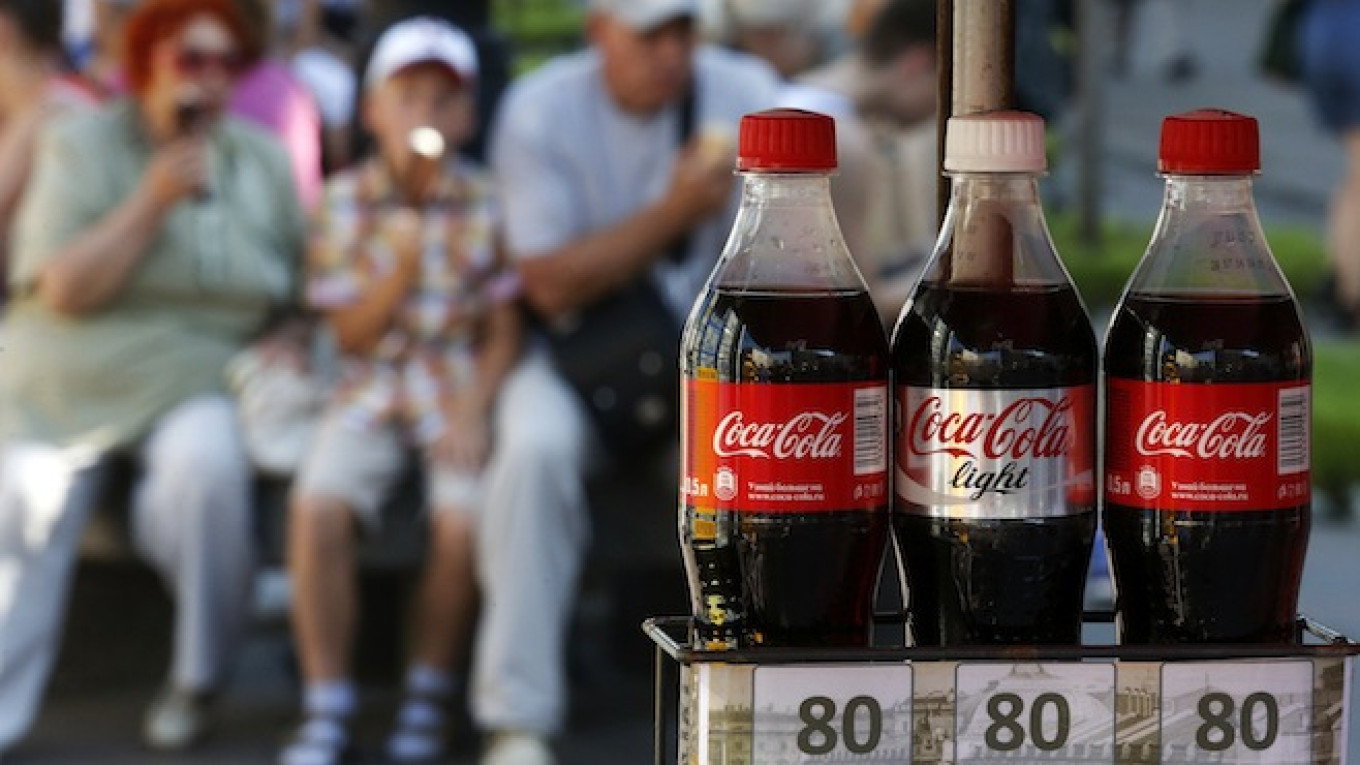As Russia's sanctions thumping match with the West escalates, the country's Communist lawmakers have demanded a tax on "unfriendly" U.S. drinks giant Coca-Cola — in a motion that reads like a carbon-copy of what their supposed opponents in the U.S. Congress had initiated just days earlier.
The Communist faction in the State Duma will introduce legislation this fall to tax sugary drinks such as Coca-Cola to make the nation healthier and, according to the party's chief lawyer, punish the company for its supposedly anti-Russian stance, newspaper Izvestia reported Thursday.
What makes the initiative particularly pop is that a similar proposal for taxing sugary drinks was introduced just last week in the U.S. Congress. Indeed, U.S. politicians have been floating the idea for more than a decade.
Under the Russian bill, taxes could range between $0.10 to $0.28 per liter, depending on the drink's sugar content, mimicking a similar tax in Denmark, the Communist Party's chief lawyer, Vadim Solovyov, told Izvestia.
Solovyov argued it was time to punish Coca-Cola after it pulled advertisements off four Russian television channels this week, saying it needed to rethink marketing plans following a second-quarter fall in sales. The company denied that the decision was related to U.S. and European sanctions against Moscow for its policies in Ukraine.
The denial did not convince Solovyov, who was quoted by Izvestia as saying: "A boycott against this drink would be good, because that was a clearly unfriendly step toward Russia."
The Communists' key gripe, however, is that "sweet drinks, Coca-Cola in particular, are a leading reason for obesity and related diseases," Solovyov said, adding that revenues from the tax "could be targeted at fighting diabetes and other terrible illnesses."
Both arguments bear a striking resemblance to those advanced by the author of the U.S. bill, Congresswoman Rosa DeLauro.
"There is a clear relationship between sugar-sweetened beverages and a host of other health conditions, including diabetes, heart disease, obesity and tooth decay," DeLauro, a Democrat from Connecticut, said in a statement on her website last week.
The preface to her bill also said that the U.S. should "dedicate the revenues from such tax to the prevention, treatment, and research of diet-related health conditions."
Links between sugar consumption and obesity and related illnesses have been stressed by a significant number of doctors and medical researchers in the U.S. and other Western nations.
New York State tried to introduce its own tax on sugary drinks a few years ago, but the proposal has fizzled, at least for now, after opposition came from a group called New Yorkers Against Unfair Taxes that argued in its television ads that the tax would put an unfair burden on hard-working, low-income folks.
"Some people get more affected than the others," a woman said in one of the ads. "People that have money, there's no problem. People that have low income, it's a lot of problems."
People with low incomes are, of course, exactly the group of people whose interests Communists are supposed to protect.
See also:
Coca-Cola Warns of Falling Volumes Due to 'Sudden Deterioration' in Russia
Contact the author at bizreporter@imedia.ru
A Message from The Moscow Times:
Dear readers,
We are facing unprecedented challenges. Russia's Prosecutor General's Office has designated The Moscow Times as an "undesirable" organization, criminalizing our work and putting our staff at risk of prosecution. This follows our earlier unjust labeling as a "foreign agent."
These actions are direct attempts to silence independent journalism in Russia. The authorities claim our work "discredits the decisions of the Russian leadership." We see things differently: we strive to provide accurate, unbiased reporting on Russia.
We, the journalists of The Moscow Times, refuse to be silenced. But to continue our work, we need your help.
Your support, no matter how small, makes a world of difference. If you can, please support us monthly starting from just $2. It's quick to set up, and every contribution makes a significant impact.
By supporting The Moscow Times, you're defending open, independent journalism in the face of repression. Thank you for standing with us.
Remind me later.



